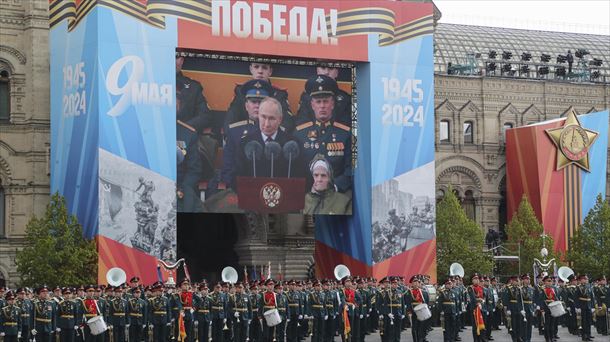ORF correspondent Christian Wehrschütz spoke in Kiev with Yulia Tymoshenko, probably the best-known opposition politician in the war-torn country – she too sees no chance for peace at the moment.
Since the start of the Russian attack in late February, a kind of martial law has been in place in Ukraine and there has been massive censorship. In concrete terms, this also means enormous restrictions for political parties, the opposition and the media. For example, all so-called or actual pro-Russian parties and three TV channels were banned. But the state-supporting Ukrainian opposition also has to live with enormous restrictions.
This means, among other things, that all financing of the state party will be abolished for the coming year. One of the most famous opposition politicians is Yulia Tymoshenko, a political veteran of Ukraine. She is at a conference in Vienna on Friday. Ukraine correspondent Christian Wehrschütz has already spoken to her in Kiev.
Before the interview, Tymoshenko, on behalf of her Homeland party, handed over an all-terrain vehicle to the Ukrainian army in the courtyard of the party headquarters in Kiev. This gift has more than just symbolic power, as the party has been more of an aid organization than a political movement since the beginning of the war. “Since the first day of the war, we’ve evacuated large families, sick children, children with cancer, we’ve done that all over the country, from the hottest places,” said the woman with the signature braided hair ring.
“We also supply food and medicines to people who are in isolation. We are equipping almost all hospitals in Ukraine with the necessary equipment because there is now an influx of injured but also traumatized people who are under very great stress.”
All TV stations aligned
Media were not present when the car was handed over to the armed forces. In fact, all the major TV stations are politically aligned, and the Telegram channels, which are so important in Ukraine, aren’t exactly pluralistic either, they say. “Once a week I have access to television for 3 minutes with a special permit,” says Tymoshenko. “That goes for almost all opposition MPs, that goes for all opposition party leaders, and unfortunately freedom of expression suffers a lot these days.
Telegram channels also have their owners, and only Telegram channels that are well funded and genuinely care about today’s rulers thrive. That is why there is little freedom of expression in Ukraine today and unfortunately there is little parliamentarism and democracy, maybe that is also a result of the war.”
Parliament also no longer offers the opposition a platform, because here too there are enormous restrictions, all of which are justified by the war. Tymoshenko: “The war certainly leaves its mark. Today Parliament does not work openly because no one announces when Parliament meets, mass media are not allowed for fear of attacking Parliament if the enemy knew when Parliament is sitting. But MPs pass important laws; this will soon include Ukraine’s budget for next year.
This is an important document as it provides maximum funding for the defense of the country. General: Parliament is working hard, but we can’t inform about meetings in advance, we can’t make them public and that certainly leaves a certain impression of the quality of parliamentarism.”
After the victory a new constitution
Is there any hope of a return to clear democratic rules? “I hope that after our victory, instead of the constitution, which is still post-Soviet, we will be able to conclude a new social contract in Ukraine. This treaty will give us a system of government with a clear separation of powers, with a judicial power and special structures that can handle cases of corruption – where every official is controlled and responsible for every action.”
But at the moment the end of the war is not yet in sight. The leader of the Fatherland Party also sees no basis for negotiations with Russia, which is making demands that Ukraine simply cannot accept, Tymoshenko said. “One of their conditions is that the occupied territories must belong to the Russian Federation, secondly, a significant reduction of the Ukrainian army under the guarantees of the Russian Federation, which guarantees our inviolability of borders and our peaceful life.”
Towards the next war?
Can Ukrainians today accept such conditions? Tymoshenko: “Disarm unilaterally, believe in the guarantees of the Russian Federation and surrender the already occupied territories? Well, the third condition was that we do not join NATO and remain alone and vulnerable again.
Therefore, the question of the Ukrainians is: ‘If you disarm our army, prevent you from joining an effective security system, take the already occupied territories from us, is such a so-called ‘peace treaty’ not the way to the next war?’ ”
Also: “If the Russians tell us we are going to sit down for peace talks, but we tell you in advance that the territories we have annexed to Russia are no longer yours, what are those starting positions? No one in the world takes Vladimir Putin’s and Russia’s desire to negotiate seriously, and so we remain at an impasse; all we and our allies have to do is fight for our country, defend our country and win.”
So the weapons will likely continue to speak as long as a preliminary decision in the war of attrition is made on the battlefield or a fundamental agreement is reached between Russia and the US, whose geopolitical conflict is currently being fought on Ukrainian soil.
Source: Krone
I’m Wayne Wickman, a professional journalist and author for Today Times Live. My specialty is covering global news and current events, offering readers a unique perspective on the world’s most pressing issues. I’m passionate about storytelling and helping people stay informed on the goings-on of our planet.


